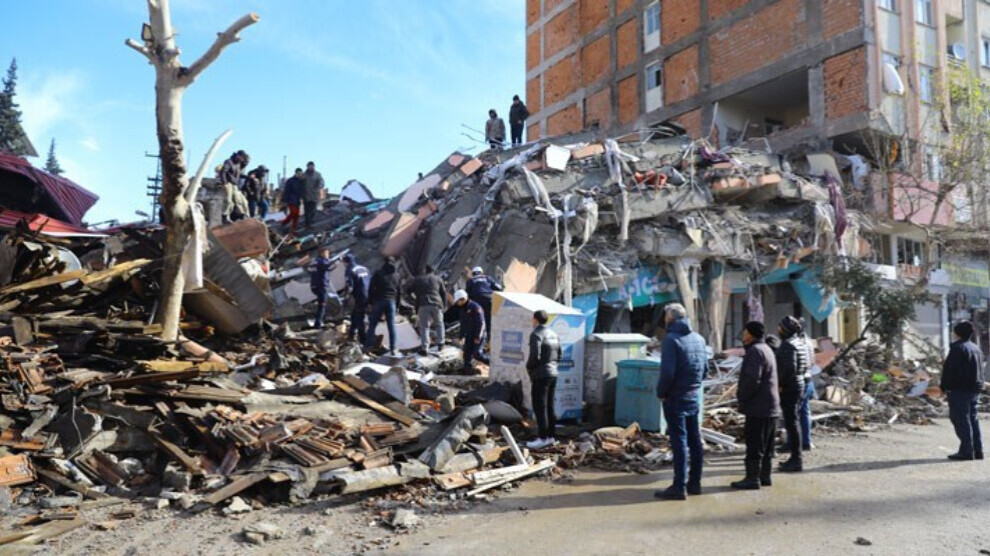SYRIAN KURDISTAN
Four months after the earthquake, people of Hatay still can’t access clean waterFour months after the earthquake, people in the southern province of Hatay still have difficulties accessing clean water.

ANF
HATAY
Tuesday, 13 Jun 2023, 13:39
With the earthquake on 6 February in the Turkish-Syrian border region, the drinking water supply has also collapsed in many affected areas. In the particularly hard-hit province of Hatay in southern Turkey, people are queuing for hours to get just 1.5 liters of clean water. This is because tap water is contaminated and even causes skin irritations and infections when washing. At the same time, the state has been collecting money for water and electricity supply again since 31 May and is also demanding back payments for the months immediately after the quake.
NGOs started to leave the city one by one
Seda Yüce is a member of Earthquake Solidarity in Hatay. Speaking to ANF about the current situation of the earthquake victims, she said that their problems have not changed. “It is true that the impression of the disaster was temporarily alleviated by the presence of aid organisations and non-governmental organisations on the ground. But this ended in April, when NGOs started to leave the city one by one. At the moment, local solidarity initiatives are practically shouldering the humanitarian work alone. In the first phase, aid came from many parts of Turkey. This continued for two months after the earthquake. Field kitchens, hospitals and pharmacies were set up and aid was organised. Since the end of April, however, there has not been the same level of activity on the ground as in the early days. Part of it was withdrawn because the aid could not be provided in this continuity. The problems are structural. Short-term or provisional solutions will not get you further than a certain point. No matter how hard civil organisations try, they cannot fill the gap left by the state. Official planning and mobilisation of large resources are needed for the next steps. Special laws need to be passed for these regions, special budgets set up and personnel allocated," Yüce said.
Queuing for two hours for 1.5 litres of water
Remarking that access to drinking water remains difficult, Yüce stated: “The CHP-run Hatay Municipality and other municipalities in the province are also not providing enough services. This threatens the health of the population. People are queuing for drinking water and unbelievable scenes are taking place. They queue for hours to get a 1.5 litre bottle of water. In these hot temperatures, they drink the water they get while queuing. There is no clean water from the mains, the pollution level of the water varies from region to region. People bathe and wash their clothes with tap water, but they get skin problems, itching, and the water causes infections. There are now extremely many mosquitoes and flies in the city. There are serious problems with rubbish collection and disposal. All these conditions increase the risk of epidemics. A government hospital has been opened in Defne and it is extremely overcrowded. Hospitals can hardly provide better services than health centres at the moment. Clinics are not able to conduct tests and examinations. Many women do not go to the hospital because the technical equipment is inadequate for gynecological diseases. We observe that people don't believe they will get proper treatment."
Water bills are issued
Yüce explained that residents of severely damaged and destroyed buildings were exempted from paying running costs. However, houses that were not destroyed and, although uninhabitable, were classified as slightly and moderately damaged, and received electricity and water bills. These bills even included the months after the earthquake when there was no supply at all.
Paying for solidarity
In particular, people who supplied others with electricity, as the electricity supply had partially collapsed or supplied salvage workers with electricity, are experiencing extreme hardship as a result. Yüce said that electricity bills reached up to 10,000 liras. "The houses in the neighbourhoods that had not collapsed, if they had electricity at all, supplied their neighbours and the tents with electricity. They shared their electricity so that people didn't have to freeze and sit in the dark. But it is not only the electricity used by a house that is billed. There is collective electricity use. These bills cannot be paid. People have no livelihood. They have no work. They are helpless. They try to develop their own methods. Nobody lives in the damaged houses. They only go to their houses from time to time to get supplies. When they come home, they find the bills. Some people also wait in front of their houses and try to prevent electricity invoicing. There must be an arrangement that the bills are not collected in the earthquake area. The municipalities, when challenged, claim that they have to invoice the electricity because they have not been informed of any other decision."
No comments:
Post a Comment